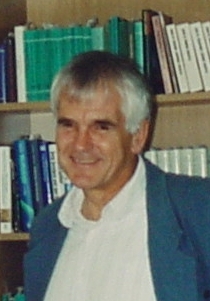Arno Ros
Arno Ros ( born December 18, 1942 in Hamburg ) is a German philosopher and professor of philosophy.
- 2.1 Argumentation Theory
- 2.2 epistemology, the role of philosophy
- 2.3 Philosophy of Mind
- 3.1 monographs
- 3.2 Papers
Biography
First study and teaching
Ros studied Ibero- Romance languages , sociology, literature and philosophy in Hamburg, Madrid (Spain) and Coimbra ( Portugal). He received his doctorate in 1971 with the thesis: On the theory literary narrative. His habilitation he put in Saarbrücken from as an employee of Kuno Lorenz. The title of his habilitation thesis was: philosophy as a methodological sense criticism. In the following years Ros owner of representation and visiting professor in Hamburg, Saarbrücken and was Campinas ( Brazil).
Chair in Magdeburg
From 1994 to 2009 he was Professor of Theoretical Philosophy at the Otto -von- Guericke- University Magdeburg. His work focuses on there especially systematic and historical issues of argumentation theory with special emphasis on the theory of concepts ( the concept of the term ) as well as systematic and historical questions of philosophy of biology and psychology with special emphasis on philosophical aspects of the mind -matter problem.
Among his students, he is known and appreciated especially for its conceptual and exact reasoning and teaching skills. In his lectures he understands how complex subject areas historically the same time, systematically ( for problems as well as by components) and methodically present.
Philosophy
Argumentation theory
Ros is concerned ( also as a result of his activities as an employee of Kuno Lorenz ) with argumentation theory and analyzed in the course of which the terms concept, rationale and explanation as well as the typology of statements (statements by specifying various causae ). A special contribution to the theory of argumentation provided Ros by his three-volume monograph reasoning and term (1989/1990), where he out worked changes the understanding of conceptual arguments on a grand scale from both a historical ( from antiquity to the modern era ) and from systematic point of view.
Epistemology, the role of philosophy
The term term is understood in Rosscher philosophy in line with the philosophy of the late Wittgenstein, that is as a linguistic nameable and erläuterbare discernment or discrimination habit. The epistemological starting point is that we as subjects exclusively by gain knowledge about parts of the world that we classify and categorize objects (entities ), ie of distinctive capabilities make use of. The problem here is the fact that our distinctive skills and biologically may be due, reducing the possibility of objective justification is questioned both learned and culturally determined as. Hence the role of philosophy, which does not apply in contrast to the individual sciences, our distinctive habits, but she thinks instead, ie investigated whether these distinctive habits are sensible or reasonable.
Philosophy of mind
Within the philosophy of mind emphasizes Ros as argumentation theorists special is that it is first important to specify the exact problem. Physical changes are distinguished from biological changes that are purposeful to former activities as a living being in opposition and are intended as a response to a stimulus. In humans also is added, that he is able to be guided by rules. From the concept of the living Ros thus comes to the concept of action subject of this turn to the concept of person, which is characterized in that it has psychic phenomena. His conception of the mind -matter problem has outlined Ros in Matter and Spirit ( 2005). Moreover, the 2008 essay " Mental Causation and mereological explanations ", in which Ros wants to dissolve the problem of mental causation by mereological explanations appear.
In addition, he published mainly in the latter time some more essays on the philosophy of mind:
Ros speaks in the philosophy of mind ausdrücklicherweise of psychic phenomena rather than mental or spiritual states ( as it is actually common in the current discussion ). Under mental states he understands only higher cognitive functions (such as problem solving, use of abstract concepts, etc.). For psychological but also includes such phenomena as tantrums, why Ros avoids mentally and spiritually the terms.
Works
This is a selection of the works of Arno Ros. The complete list of publications can be found at links.
Monographs
- 2005: matter and spirit. A philosophical investigation, Mentis, Paderborn, 2005, 686 pages.; ISBN 3-89785-397-3. Table of Contents (PDF, 85 kB) Review of J.R.J. Schirra (PDF file, 127 kB)
Papers
- 2007: " free will, authorship and chance ", in: Hans -Peter Krüger ( eds ): Brain as a subject? Philosophical border issues in neurobiology. , Academy, Berlin, pp. 305-348. Online version (PDF, 283 kB)
- 2007: " The immediate self- consciousness: What it is and how it may have developed. ", In: Michael Pauen, Michael Schuette, Alexander Staudacher (ed.): concept, explanation, consciousness. New posts to the qualia problem., Mentis, Paderborn, 2007, pp. 273-305. Online version
- 2008: "Mental Causation and mereological explanations A simple solution to a complex problem.. ", In: German Journal of Philosophy, 56 /2 ( 2008) :167 - 203. Online version (PDF, 313 kB)
- 2009: " Synthetic materialism A new approach to clarifying philosophical aspects of the mind -matter problem. ". In: Ideas, 70 (2009) :127 - 140. Online version
- 2012: "On some methodological errors in the recent discussion on philosophical aspects of the mind -matter problem." In: e-journal Philosophy of Psychology, 16 (2012 ). Online version (PDF, 278 kB)









